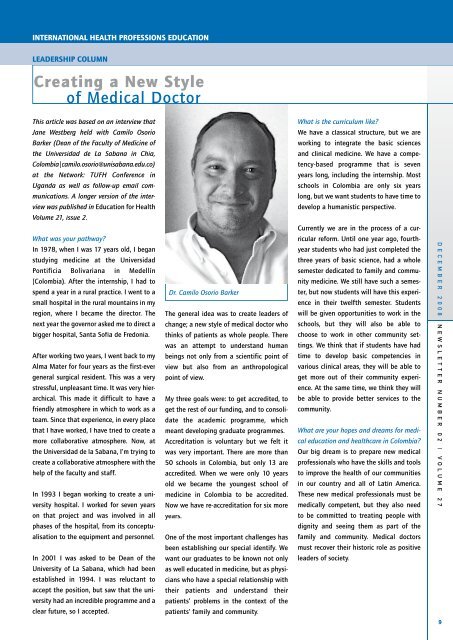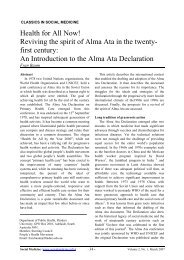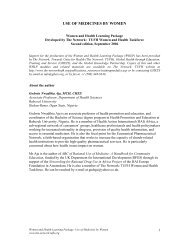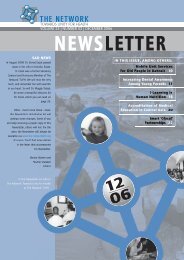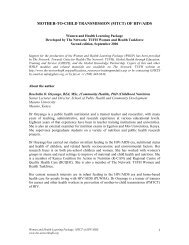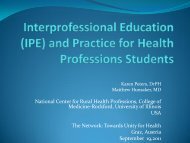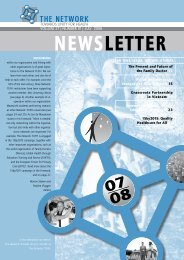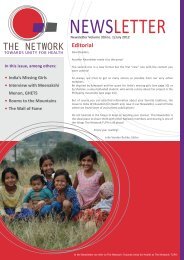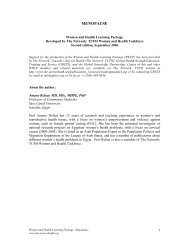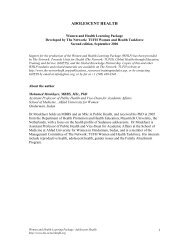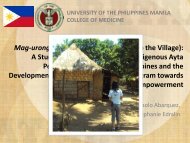The network - Towards Unity For Health
The network - Towards Unity For Health
The network - Towards Unity For Health
Create successful ePaper yourself
Turn your PDF publications into a flip-book with our unique Google optimized e-Paper software.
INTERNATIONAL HEALTH PROFESSIONS EDUCATIONLEADERSHIP COLUMNCreating a New Styleof Medical DoctorThis article was based on an interview thatWhat is the curriculum like?Jane Westberg held with Camilo OsorioWe have a classical structure, but we areBarker (Dean of the Faculty of Medicine ofworking to integrate the basic sciencesthe Universidad de La Sabana in Chia,and clinical medicine. We have a compe-Colombia|camilo.osorio@unisabana.edu.co)tency-based programme that is sevenat the Network: TUFH Conference inyears long, including the internship. MostUganda as well as follow-up email com-schools in Colombia are only six yearsmunications. A longer version of the inter-long, but we want students to have time toview was published in Education for <strong>Health</strong>develop a humanistic perspective.Volume 21, issue 2.Currently we are in the process of a cur-What was your pathway?ricular reform. Until one year ago, fourth-In 1978, when I was 17 years old, I beganstudying medicine at the UniversidadPontificia Bolivariana in Medellín(Colombia). After the internship, I had tospend a year in a rural practice. I went to asmall hospital in the rural mountains in myregion, where I became the director. <strong>The</strong>next year the governor asked me to direct abigger hospital, Santa Sofia de Fredonia.After working two years, I went back to myAlma Mater for four years as the first-evergeneral surgical resident. This was a verystressful, unpleasant time. It was very hierarchical.This made it difficult to have afriendly atmosphere in which to work as ateam. Since that experience, in every placethat I have worked, I have tried to create amore collaborative atmosphere. Now, atthe Universidad de la Sabana, I’m trying tocreate a collaborative atmosphere with thehelp of the faculty and staff.In 1993 I began working to create a universityhospital. I worked for seven yearson that project and was involved in allphases of the hospital, from its conceptu-Dr. Camilo Osorio Barker<strong>The</strong> general idea was to create leaders ofchange; a new style of medical doctor whothinks of patients as whole people. <strong>The</strong>rewas an attempt to understand humanbeings not only from a scientific point ofview but also from an anthropologicalpoint of view.My three goals were: to get accredited, toget the rest of our funding, and to consolidatethe academic programme, whichmeant developing graduate programmes.Accreditation is voluntary but we felt itwas very important. <strong>The</strong>re are more than50 schools in Colombia, but only 13 areaccredited. When we were only 10 yearsold we became the youngest school ofmedicine in Colombia to be accredited.Now we have re-accreditation for six moreyears.year students who had just completed thethree years of basic science, had a wholesemester dedicated to family and communitymedicine. We still have such a semester,but now students will have this experiencein their twelfth semester. Studentswill be given opportunities to work in theschools, but they will also be able tochoose to work in other community settings.We think that if students have hadtime to develop basic competencies invarious clinical areas, they will be able toget more out of their community experience.At the same time, we think they willbe able to provide better services to thecommunity.What are your hopes and dreams for medicaleducation and healthcare in Colombia?Our big dream is to prepare new medicalprofessionals who have the skills and toolsto improve the health of our communitiesin our country and all of Latin America.<strong>The</strong>se new medical professionals must bemedically competent, but they also needto be committed to treating people withdignity and seeing them as part of theD E C E M B E R 2 0 0 8N E W S L E T T E R N U M B E R 0 2 | V O L U M E 2 7alisation to the equipment and personnel.In 2001 I was asked to be Dean of theUniversity of La Sabana, which had beenestablished in 1994. I was reluctant toaccept the position, but saw that the universityhad an incredible programme and aclear future, so I accepted.One of the most important challenges hasbeen establishing our special identify. Wewant our graduates to be known not onlyas well educated in medicine, but as physicianswho have a special relationship withtheir patients and understand theirpatients’ problems in the context of thepatients’ family and community.family and community. Medical doctorsmust recover their historic role as positiveleaders of society.9


